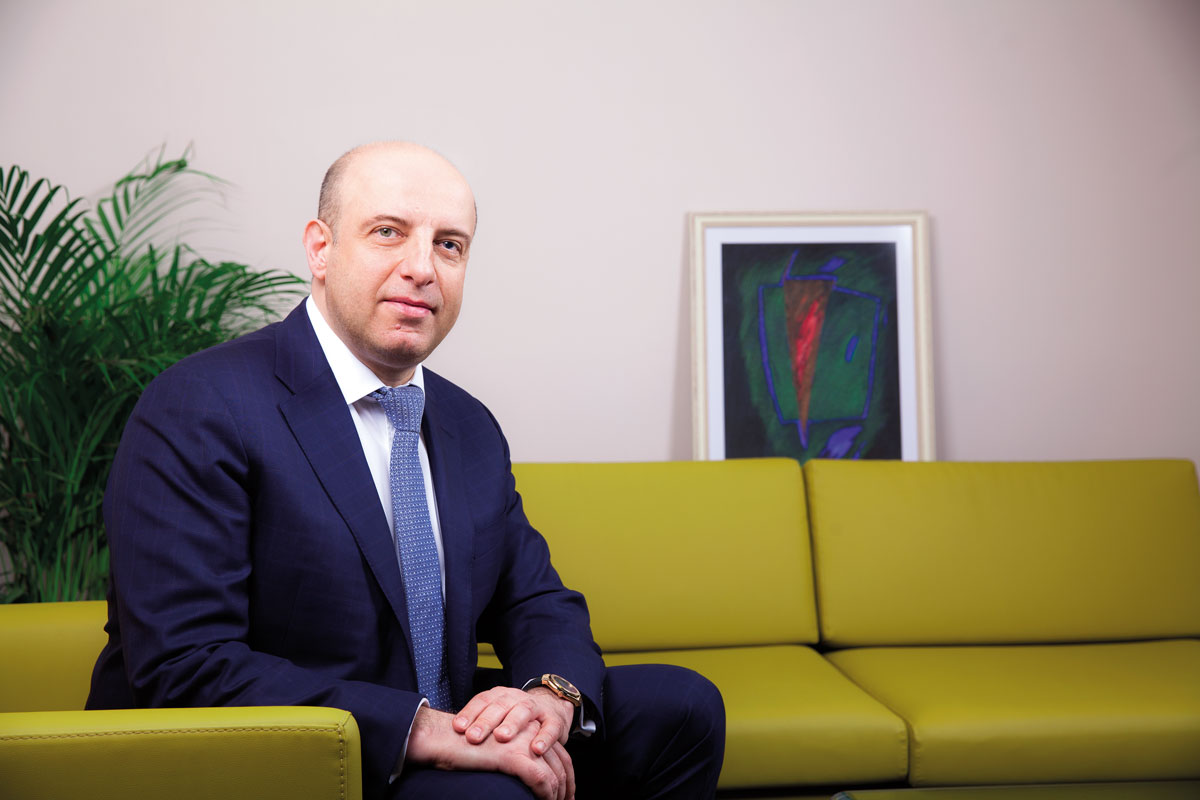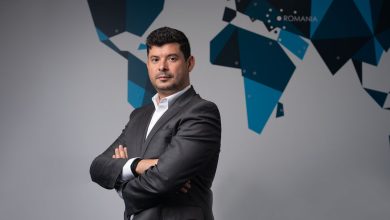Claudiu Doros: Top priority for the Romanian capital market
Claudiu Doros – Director General, highlights the key preconditions for the development of the Romanian capital market and company’s plans for the following years.
Shareholdings in the energy sector represent an important segment of assets managed by SIF Moldova SA – one of the most representative financial investment companies in Romania.
How do you see the evolution of Financial Investment Companies (SIFs) on the Romanian market in the years passing from the establishment of the first Private Property Funds (FPPs)? What is SIF Moldova’s position on this market?
Claudiu Doros: The role of FPPs and later of SIFs in the process of formation of an important segment of Romanian private capital and subsequently of the domestic capital market is well known.
But, beyond the chronological references of our evolution – the establishment of FPPs (1992), their transformation into SIFs (1996), the listing of SIF shares on BSE (1999) and, very recently, the approval of SIF Moldova as AIFM – Alternative Investment Funds Manager, according to Romanian and EU legislation, I consider it relevant to analyse our performances relative to the quality of the initially allocated portfolios, the evolution of the capital market and the dynamics of the applicable legislative framework.
Thus, comparison with the portfolios initially allocated to the other SIFs reveals that, at the beginning of the activity, we had a lower quality portfolio, as potential for gain and growth, as the region of Moldavia was perhaps less developed than the other historical regions, and the textile industry (national allocation) was and has proven to be a sector with low added value.
Subsequently, the decisions made regarding the portfolio management, the capital investments, the involvement in the portfolio companies’ management, the increase in the quality of our own human resources targeted and ensured the transformation of FPP II Moldova into SIF Moldova and, currently, into an AIFM positioned mainly on the Romanian market, as a closed-end fund with predominantly equity investments, medium risk and temporary liquidity placements in fixed income instruments.
Listing SIF2 shares on BSE was another significant milestone in our evolution, with positive implications, on both SIF Moldova and SIF2 titles’ performance and on the Romanian capital market as a whole.
This entire path, accelerated by the development and implementation of coherent multi-annual strategies tailored to the dynamics of the capital market and economic environment, has constantly generated performance. The results estimated for 2017 show that the financial indicators provided in the draft budget have been exceeded, both at the level of the net profit of RON 165mln and in terms of investments of RON 272mln, performance reflected in shareholders’ benefits and representing favourable prerequisites for supporting the investment strategies in the directions presented in the annual programs and multi-annual strategies. I mean, especially on two main pillars – finance and energy.
Investors have validated on BSE our strategy and performances, and their increased interest has materialized in the rising price of SIF2 shares, by 81% in 2017, growth continued in January 2018. Also, the discount, i.e. the difference between the unitary net assets and the market price, fell from 50% in early 2017 to 22% at the end of the year. Therefore, the value of our assets is more accurately recognized, around EUR 400 million equivalent.
Moreover, in the sector in which it carries out its activity, financial investment companies, and in relation to the results for 2017, SIF Moldova has the highest values in terms of net profit and market capitalization (company’s value on BSE).
With an exposure of around 20% of the total asset on energy companies (at the end of 2017), of which over 8% on OMV Petrom issuer, SIF2 Moldova is one of the players with a strong voice in their market evolution. For this reason, you probably monitor carefully this sector. In this context, what is in your opinion the explanation for the relatively poor evolution of the energy index (BET-NG), especially in the last part of 2017? (it closed the year around 660 points – just over the level of around 620 points at which it opened the year of 2017).
Claudiu Doros: First of all, I confirm that our analysts dedicated to the portfolio of listed shares monitor very carefully the energy sector and the included companies, decisions to increase our exposure or, on the contrary, reduce it through sales, being made regularly, depending on the estimated and realized results of each company.
Secondly, of course, in general, the market price of companies in the sector and the performance of the related index are influenced by several objective and subjective factors, intrinsic or unrelated to the management of companies, but, particularly, there are several elements that have led to a poor performance of certain companies or their market price.
Thus, we recall the sharp growths in energy prices on the profile market, which led to losses for ELECTRICA and automatically a decline and capping of EL titles on BSE, as the management of this company did not manage to anticipate these causes or offset them through hedging policies.
Also, closely related, but also due to the regulatory risk produced by capping tariffs, TRANSELECTRICA had an underperformance in terms of financial results, with a negative effect on TEL titles. Especially these two companies have ‘pulled down’ the index, but SIF Moldova has reduced its position in due time, before selling all these shares from its portfolio. Nothing prevents us from continuing to monitor their evolution or reinvest here when we anticipate positive results.
Let’s not forget the too often changes in the management structures, at executive level or in the Board of state-owned companies, changes which are far from providing the continuity and predictability necessary for performance anywhere in the world and which have raised question markets on the necessary competences for a good corporate governance and expected results for such large companies which have a favourable position on their markets.
Another interesting company (and share) is SNP Petrom, which has a decisive position in the market and in the structure of the index. Although the forecasted results for the end of 2017 are particularly good, helped by the positive evolution of oil prices and steps taken in the direction of exploration in the Black Sea, the share has not performed enough, but we are expecting it to do so. Probably the ‘threat’ of additional sales by Fondul Proprietatea, once the lock-up period is over, has capped the evolution of SNP titles and implicitly of the BET-NG index.
It’s no secret for investors following our regular reports that we have maintained important holdings in our portfolio of shares in ROMGAZ and TRANSGAZ. These two companies, very important for Romania, helped by the local and regional context, as well as by a relative management stability, have managed to show performance and deliver good financial results. They have also generated appealing dividends for shareholders. Our analyses show they will continue this trend.
Additionally, how do you appreciate and explain the evolution of BET-NG index in the first part of 2018 (when it went up to around 720 points)? (SIF2 has holdings of around RON 330mln in energy companies – of a total asset of RON 1.2bn).
Claudiu Doros: Amid the general market trend, we continue to have optimistic expectations on dividends granted by issuers in this sector, as I have already mentioned. There is also a positive evolution of the activity of these companies maintained over a medium and long term. Hence the higher prices and the growth of the BET-NG index.
Through the investment strategy for 2014-2018 proposed to investors, SIF2 has undertaken to consolidate its shareholdings in the energy sector. What are SIF2 Moldova’s plans for the following years in terms of the energy sector listed on BSE and what are the guidelines they will be built on?
Claudiu Doros: SIF Moldova has maintained important shareholdings in the energy issuers, given the solidity of these businesses, their dominant position, the long-term sustainability and the estimated dividend flow, in conditions of superior fundamental indicators than those of other regional and EU companies in the sector.
We maintain our investment interest in this sector, but decisions will be adopted punctually, based on the close monitoring of evolution and perspectives of issuers and of the sector.
Given the national macroeconomic assembly, what are your estimates/expectations on the financial results (business evolution in general) for companies in the energy sector in 2018? What are your expectations/estimates on Romania’s economic evolution in the coming years?
Claudiu Doros: The official data show a spectacular economic growth, with good prospects for the coming years. The forecasts for 2018 indicate a sustained growth pace. But we also pay attention to the economic growth engine, in this case consumption, and we direct our policies and investment targets to issuers that, by nature of their activity, are favoured by this context.
However, we have a prudent optimism in terms of medium-term evolutions, because we cannot ignore the possibility of a deterioration of the macroeconomic environment, with influences on the capital market. In this context, applying AIFM regulations on risk management, including those related to financial instruments, is essential for us.
Companies in the energy sector have been among the best positioned issuers on BSE in terms of dividends paid in 2017 (considering in this case including the payment of additional dividends, made at the express request of the Romanian state). How do you believe companies in this sector will behave in 2018? What are your estimates in terms of dividends related to this year?
Claudiu Doros: As I briefly pointed out, the results for 2017 recorded by issuers in the energy sector certify the existence of contrasts between the sub-sector Oil & Gas, which performed amid an increase in oil and gas prices, investors maintaining their optimistic expectations regarding dividends to be distributed, and the sub-sector related to electricity, transmission and distribution, with modest financial results, which compromise chances of granting dividends with a reasonable yield in 2018, for the year ended.
Following the latest reports on the detailed portfolio structure, we can notice the lack of entities such as SNN (Nuclearelectrica) and/or EL (Electrica). What is the investment strategy of SIF2 Moldova regarding these companies?
Claudiu Doros: We are in the phase of analysis and development of the investment program for 2018, following to submit for analysis and approval by our shareholders the main investment objectives within the General Meeting scheduled for 26/27 April 2018, according to the financial communication schedule. As you very well observed, we don’t have SNN shares, because, until the recent good evolution, between the listing price and the market price, over the recent years, there have been a big decline, which would have led to losses of return in our portfolio. EL shares were sold before the declines in the second half of 2017, for the previously mentioned reasons.
What are in your opinion the chances to upgrade the Romanian capital market to the status of Emerging Market and to which extent do you believe this could have a favourable impact on the evolution of profile companies?
Claudiu Doros: I believe that, currently, a ‘zero’ priority is increasing liquidity, an essential condition for the development of the Romanian capital market and thus for the upgrade to the status of emerging market, not only formally, but also functionally and not only for a short term, but permanently.
I don’t have enough elements to estimate the chances for this to happen, other than those well known, and which have proven to be insufficient. It is obvious that, as shareholders in BSE, we put our hope in the personal dynamism of the new Director General – Adrian Tanase, but he must be supported by market players and authorities, because the Stock Exchange belongs to Romania and it does not reflect yet sufficiently the state of the economy.
What do you think are the opportunities and challenges faced by Romanian companies in the energy sector for the next years?
Claudiu Doros: As I have mentioned, the sector is not unitary as performance and it should be analysed in detail on sub-sectors and at the level of each company. Opportunities could be generated by favourable macroeconomic evolutions, the consolidation of positions on the domestic and regional market, and challenges may occur from the need for massive investment programs and from adaptation to the dynamics of the economic and legislative environment, taxation policies being likely to have a significant impact. Regional integration may play a significant role, in conditions of extremely refined prior analyses in terms of added value of investments for business growth and risk control.
In your opinion, what are the chances for the long-awaited listing of Hidroelectrica to take place? What are the elements that could speed this process? How about those that could delay it?
Claudiu Doros: I am not hiding the fact that we analysed Hidroelectrica listing in the development of the activity program for 2018, as well as in 2017 and 2016… Therefore, currently it is difficult to estimate what is the timing of this project, in absence of concrete positions and estimates of the management and political decision-makers.
How do you interpret the statements of OMV (majority shareholder of Petrom) officials on the intention to internationalize the company?
Claudiu Doros: We monitor closely the statements of OMV officials and analyse their potential consequences on company’s development and performances, in order to substantiate our future position. Its excellent corporate governance structure gives us hope that any step will be for the benefit of the Romanian company and all its shareholders, not only its majority shareholder and the group it is part of.
In this context – of discussions on ‘internationalization’, how do you appreciate the steps taken by Transgaz (which enters the Moldovan market and participates in the privatization of DESFA – Greece’s profile operator)? What chances of success do you assign to these steps? With what results in the coming years?
Claudiu Doros: As I have previously mentioned, Romanian energy companies have the resources and potential strength to grow in the region, even more so in the Republic of Moldova. In absence of detailed information, which is normally presented to shareholders, we cannot estimate at this point the chances of these steps or the results, but we monitor the intentions made public. We ask the management to verify whether the substantiation and execution of this project are prepared and applied based on economic and technical criteria carefully analysed and in detail, to ensure a long-term success.
As you know, there has been and there is still a number of steps for the establishment of the so-called Sovereign Investment Fund (FDSI), which would have an important structure, made up of energy companies. How do you appreciate the establishment of such an investment vehicle and what are the effects (positive and/or negative) that it could have on the Romanian energy sector?
Claudiu Doros: As we have all seen, this project seems to be still in the crystallization phase, following the exploration of various options in terms of structure. If materialized, such a fund can become an important player in the Romanian economy, an ‘anchor’ investor that can generate a multiplier effect, with potential beneficial effects for large infrastructure projects and for the capital market. The way in which it will be established (I would prefer ‘sovereign’ to mean exactly that and no other innovations) and in which it will be managed, and in this case, I refer to a mixed management, with state representatives and Board members from the private environment, with expertise accumulated in Asset Management, is decisive.
Undertaking and complying with the international corporate governance principles are aimed at creating and maintaining confidence for investors that could assume an association with FDSI for financing and developing generous projects, whether they are banks or investment funds. Finally, any investment must be recovered with profit, so that each investor can fulfil its objective and be able to resume the investment cycle. I like to believe that those who work in the FDSI project are specialists who know this ABC and make the necessary calculations. Otherwise, it would only create another inefficient structure in which assets would be buried, whether we are talking about money or non-performing companies that cannot generate resources for the ambitious projects we need.
What are the main opportunities and challenges for SIF2 Moldova in the coming period – as a relevant player (investor) for the Romanian capital market (and, in the alternative, for the Romanian energy sector)?
Claudiu Doros: The key elements of our strategies remain:
- Solid investment policy – the basis for the long-term increase in the value of managed assets, a key element in strengthening investor confidence;
- Predictable dividend policy – remunerating the capital invested at a higher level than the returns offered by money market investments; it is designed to meet the short-term interests of shareholders. At the same time, low money market returns favour investment, which serves the medium and long-term interests of shareholders;
- Capital operations – by carrying out Share Repurchase Programs in order to reduce the share capital.
Managing the shareholdings in the portfolio will be realized based on the coordinates of the multi-annual strategy 2014-2018, i.e.:
- Growth for the Majority Shareholdings portfolio – a ‘private equity’ approach within the existing majority shareholdings (real estate, agriculture, other sectors);
- Recalibration for the CORE portfolio – the listed portfolio providing liquidity to SIF Moldova assets, representing the main income generator;
- Restructuring for the SELL portfolio – continuing the restructuring/sale of the ‘historic’ share portfolio.
The process of dynamic recalibration of the CORE portfolio will continue, in line with the performance of listed companies included in it, as well as the identification of new investment opportunities within the Majority Shareholdings portfolio, in areas with a proven growth potential, such as the real estate and agriculture sectors. We consider new residential projects, in quality locations, to capitalize on the expertise already accumulated in the field.
Shareholdings in the energy sector, included in the CORE portfolio, will be subject to the strategic approaches established for this portfolio and will continue to represent an important segment of assets managed by SIF Moldova.







